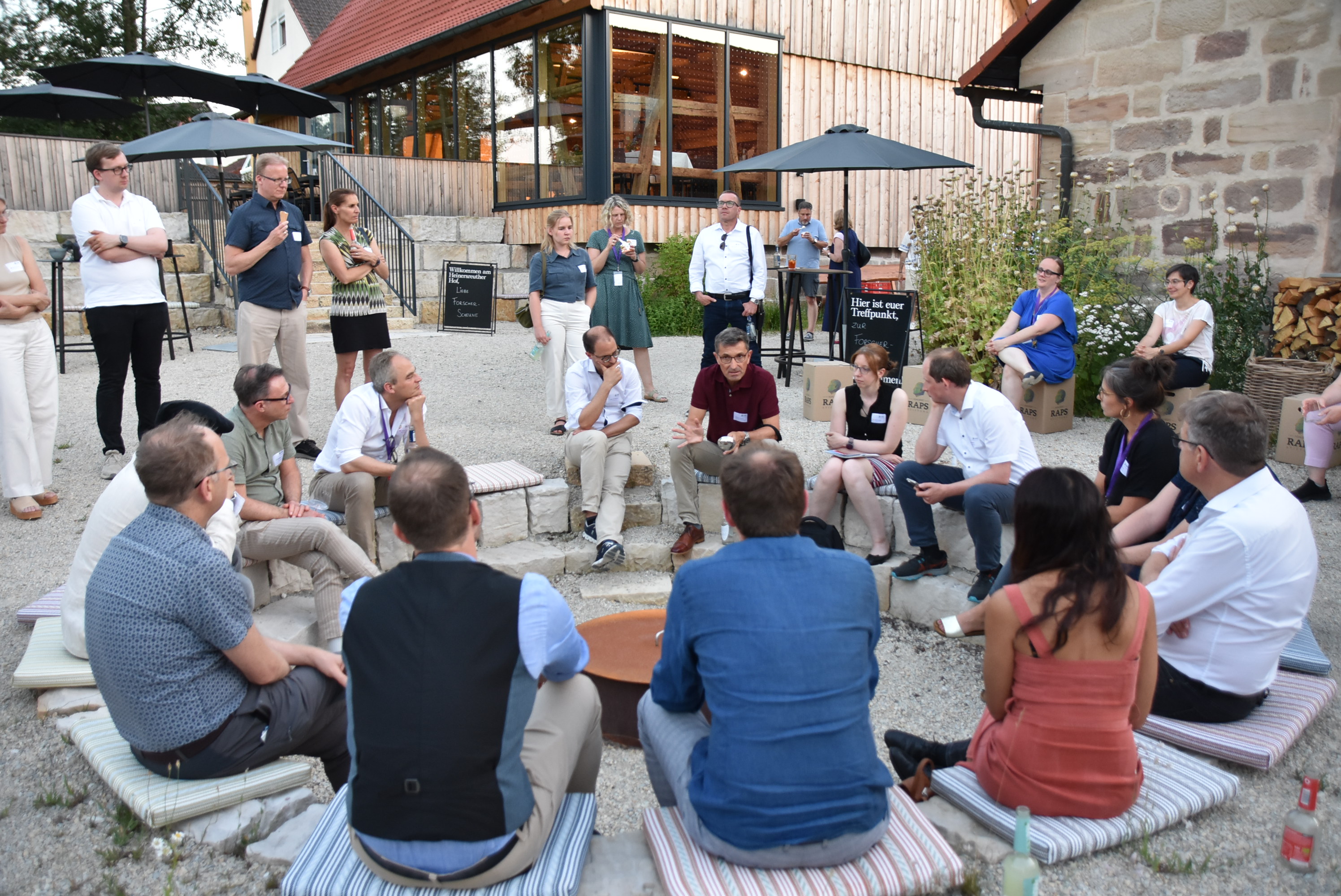The Heinersreuther Hof as a think tank
On July 2 and 3, the Heinersreuther Hof was the venue for the Adalbert-Raps-Stiftung's now traditional "Researchers' Barn".

For the 7th time, the Adalbert-Raps-Stiftung facilitated an intensive exchange between science and practice
On July 2 and 3, the Heinersreuther Hof was the venue for the Adalbert-Raps-Stiftung's now traditional "Researchers' Barn". For two days, experts from research, practice and authorities exchanged views on the nutritional concepts of the future in a relaxed atmosphere.
What about the microbiological quality of vegan products? How can we ensure a better mouthfeel with plant-based alternatives to dairy products? How can increasing consumption be met in the most sustainable way possible? Answers to these and many other questions were provided by researchers from Germany, Austria and Switzerland, who presented the results and interim results of their research projects funded by the Adalbert-Raps-Stiftung . In addition to the funded research partners, other experts had their say in supplementary formats: star chef Alexander Herrmann gave an entertaining dinner speech, professors from Coburg University of Applied Sciences gave impulses on the topic of AI at the campfire talk and food investor Jörg Reuter was invited to give the keynote speech.
Between farm slaughter and bioreactor
"I'm a food romantic," Jörg Reuter admitted at the beginning of his introductory lecture. However, the consumer society has reached "peak meat", "that doesn't suit the planet." The expert is not focusing on just one solution, namely to stop consuming meat. "That would be too short-sighted, because people in Germany want to eat a lot of meat, so we need to find creative approaches." If we could initially manage to replace 25 percent of poor animal husbandry, a lot would already be gained. "Food is community, home, reward and also culturally rooted," he said, but it also has a high negative impact on the world - which is why transformation is needed.
His solutions? Moving away from sidestream thinking, alternative products and from factory farming to circular animal husbandry. "When it comes to alternative products, we are constantly trying to replicate an original, and often at a price that is far too high." Smart Taste is the keyword here, which means "as close as possible to the original with minimal animal ingredients". However, this is not yet a viable concept. "I personally advocate a fusion of flavors and thinking of individual products more as a dish, where I can clearly taste the ingredients."
Edible nutshells
He also emphasized the need to make greater use of side streams in food production, "which is cheaper, more sustainable and healthier." As an example, he cited RE-NUT, a Swiss start-up that makes nutshells edible. "Shells can maintain roughly the same price as sugar, the main ingredient in many foods, because it is cheap," explained Reuter. The nutshells are not only cheap, they are also healthier. Millions of tons of nutshells would otherwise end up in animal feed or litter or be incinerated - even though the shells are rich in valuable fibre.
Jörg Reuter also presented circular animal husbandry as a further solution as the big (still largely unknown) sister of regenerative agriculture. "Only 30 to 50 percent of plant biomass goes directly into human nutrition," he said. The remaining 50 to 70 percent could be excellently utilized by animals. He therefore sees more need for research in the area of food waste as animal feed and the targeted use of biomass fermentation products, which in turn come from side streams. "It's a bit like 'farm to table', but in this case more like 'table to farm'." So, in essence, it's about using as many side streams as possible for human consumption, using the remaining side streams for animal feed and converting food waste into animal feed. "And we can only keep as many animals as we can feed with grass and side streams. There are already suitable organic waste composters on the market that shred and dry organic waste, "so organic waste doesn't become disgusting." This is still in its infancy, but it shows where we need to go.
After his presentation, he thanked the Adalbert-Raps-Stiftung, whose research funding was moving into areas that "are still too early for us food investors. Such investments in our food system are enormously important."
Living the network idea
The new CEO of RAPS GmbH & Co. KG, Dr. Oliver Ebneth, also introduced himself and his visions to the expert audience at the Forscherscheune. "Building the bridge between science and business is very valuable," he said. However, there is still a long way to go until "Food Valley Kulmbach". "We have to live the network idea, the Dutch do it better than us and bring many companies to the university campus," criticized Ebneth. The economy is not evil, but makes everything that is researched here possible. "We need much more cooperation."
All utopia? Of course not!
An informative and innovative event came to an end in Heinersreuth, and Frank Kühne, Chairman of the Foundation, was highly satisfied. "As a foundation, we have a social mission to network so that new solutions can be created, and that helps our community move forward." Of course, we are aware that some things may sound fantastic and utopian, "but we have to keep talking to experts to find out what course we need to set."